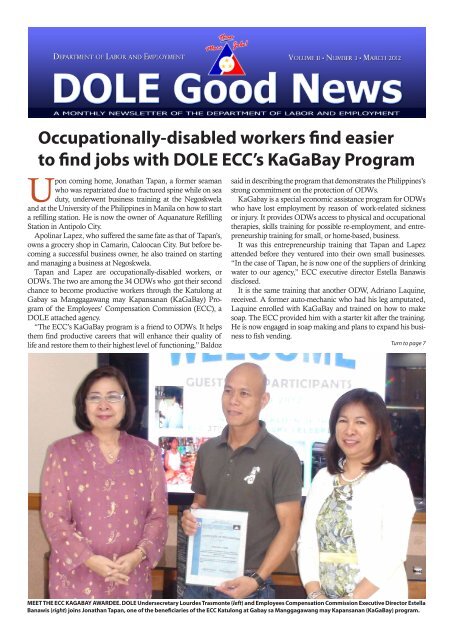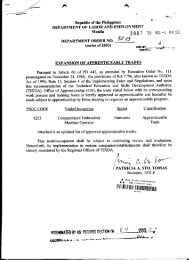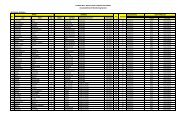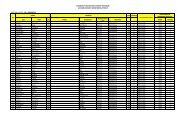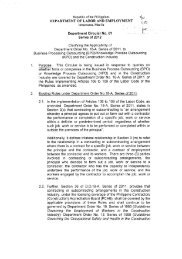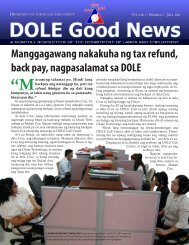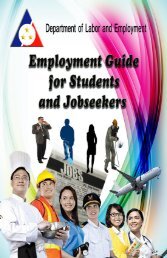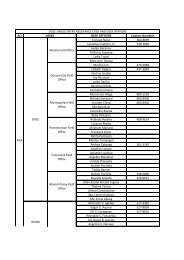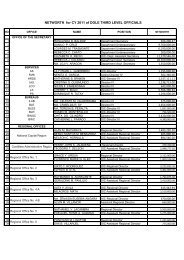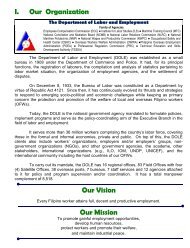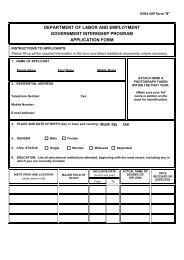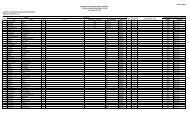Number 3 - March 2012 - DOLE
Number 3 - March 2012 - DOLE
Number 3 - March 2012 - DOLE
You also want an ePaper? Increase the reach of your titles
YUMPU automatically turns print PDFs into web optimized ePapers that Google loves.
Occupationally-disabled workers find easier<br />
to find jobs with <strong>DOLE</strong> ECC’s KaGaBay Program<br />
Upon coming home, Jonathan Tapan, a former seaman<br />
who was repatriated due to fractured spine while on sea<br />
duty, underwent business training at the Negoskwela<br />
and at the University of the Philippines in Manila on how to start<br />
a refilling station. He is now the owner of Aquanature Refilling<br />
Station in Antipolo City.<br />
Apolinar Lapez, who suffered the same fate as that of Tapan’s,<br />
owns a grocery shop in Camarin, Caloocan City. But before becoming<br />
a successful business owner, he also trained on starting<br />
and managing a business at Negoskwela.<br />
Tapan and Lapez are occupationally-disabled workers, or<br />
ODWs. The two are among the 34 ODWs who got their second<br />
chance to become productive workers through the Katulong at<br />
Gabay sa Manggagawang may Kapansanan (KaGaBay) Program<br />
of the Employees’ Compensation Commission (ECC), a<br />
<strong>DOLE</strong> attached agency.<br />
“The ECC’s KaGaBay program is a friend to ODWs. It helps<br />
them find productive careers that will enhance their quality of<br />
life and restore them to their highest level of functioning,” Baldoz<br />
said in describing the program that demonstrates the Philippines’s<br />
strong commitment on the protection of ODWs.<br />
KaGabay is a special economic assistance program for ODWs<br />
who have lost employment by reason of work-related sickness<br />
or injury. It provides ODWs access to physical and occupational<br />
therapies, skills training for possible re-employment, and entrepreneurship<br />
training for small, or home-based, business.<br />
It was this entrepreneurship training that Tapan and Lapez<br />
attended before they ventured into their own small businesses.<br />
“In the case of Tapan, he is now one of the suppliers of drinking<br />
water to our agency,” ECC executive director Estella Banawis<br />
disclosed.<br />
It is the same training that another ODW, Adriano Laquine,<br />
received. A former auto-mechanic who had his leg amputated,<br />
Laquine enrolled with KaGaBay and trained on how to make<br />
soap. The ECC provided him with a starter kit after the training.<br />
He is now engaged in soap making and plans to expand his business<br />
to fish vending.<br />
Turn to page 7<br />
MEET THE ECC KAGABAY AWARDEE. <strong>DOLE</strong> Undersecretary Lourdes Trasmonte (left) and Employees Compensation Commission Executive Director Estella<br />
Banawis (right) joins Jonathan Tapan, one of the beneficiaries of the ECC Katulong at Gabay sa Manggagawang may Kapansanan (KaGaBay) program.
<strong>DOLE</strong> Good News<br />
OFWs may now take PRC exams without<br />
returning to the Philippines—Baldoz<br />
Labor and Employment Secretary<br />
Rosalinda Dimapilis-Baldoz<br />
announced that overseas Filipino<br />
workers (OFWs) who wanted to take<br />
their board licensure examinations even<br />
if they are based overseas, can now do<br />
so at their pleasure.<br />
Baldoz said the Professional Regulation<br />
Commission has approved and issued<br />
Resolution No. 2011-627, series of 2011,<br />
revising the implementing guidelines<br />
on the conduct of Special Professional<br />
Licensure Board Examinations (SPLBE)<br />
for OFWs, pursuant to Republic Act<br />
No. 8981, otherwise known as the<br />
“Professional Regulatory Commission<br />
(PRC) Modernization Act of 2000”, and<br />
Executive Order No. 835 dated October 9,<br />
2009.<br />
“The new guidelines is our way of<br />
bringing PRC programs and services<br />
closer to the people. It simplifies and<br />
makes faster official transaction with<br />
the PRC,” Baldoz said.<br />
The PRC, an attached agency of the<br />
<strong>DOLE</strong>, has been conducting SPLBE<br />
overseas since 1997 to give qualified<br />
OFW applicants the opportunity to<br />
take the licensure exams while residing<br />
and working in the Middle East or other<br />
foreign countries without the need of<br />
returning to the Philippines.<br />
“PRC Resolution No. 2011-627<br />
Editor<br />
NICON F. FAMERONAG<br />
Director, LCO<br />
Associate Editor<br />
KAREN R. SERRANO<br />
Staff Writers<br />
JOSE C. DE LEON<br />
MARK JAIME L. CERDENIA<br />
MA. VERONICA R. ALMAZORA<br />
CELESTE T. MARING<br />
HAZEL JOY T. GALAMAY<br />
REVELITA F. LAXINA<br />
2 <strong>March</strong> <strong>2012</strong><br />
Editorial Assistants<br />
GIRLIE MARLYN E. ARCE<br />
MADELYN D. DOMETITA<br />
Graphic Artist<br />
GREGORIO I. GALMAN<br />
Photographer<br />
JOMAR S. LAGMAY<br />
Circulation Manager<br />
GIRLIE MARLYN E. ARCE<br />
directs the PRC and the Professional<br />
Regulatory Boards (PRBs) to conduct<br />
SPLBE with the active role and<br />
participation of the Department of<br />
Foreign Affairs (DFA) through its<br />
Embassies/Consulates and the <strong>DOLE</strong>,<br />
through its Philippine Overseas Labor<br />
Offices (POLOs),” Baldoz explained.<br />
Baldoz said that with the new<br />
guidelines, the <strong>DOLE</strong>, PRC, and DFA<br />
would now be jointly responsible in the<br />
administration of the SPLBE overseas.<br />
Under the new guidelines, OFWapplicants<br />
can submit requests for<br />
SPLBE by themselves through overseas<br />
professional organizations to Philippine<br />
embassies or consulates through the<br />
POLOs.<br />
“The POLOs will conduct a preregistration<br />
of OFW-applicants<br />
in coordination with the overseas<br />
professional organizations or FILCOMs<br />
to determine the number of examinees<br />
Contributing Writers<br />
GENEVIEVE S. TATAD<br />
GEORGE S. LUBIN, JR.<br />
JERIDEE C. ORATE<br />
REGINALD B. ESTIOCO<br />
JEREMIAH M. BORJA<br />
DULCE AMOR L. LEDESMA<br />
ANDREA JOY AGUTAYA<br />
RAYMOND P. ESCALANTE<br />
AMALIA N. JUDICPA<br />
EFREN O. VITO<br />
VIRGILIO A. DOROJA, JR.<br />
JAZMIN O. CINCO<br />
MILDRED E. DABLIO<br />
JOCELYN C. FLORDELIS<br />
CHARMAINE DAWN L. SONSONA<br />
FRANCIS Y. NAZARIO<br />
expected to take the SPLBE,” said PRC<br />
chairman Teresita Manzala.<br />
She said that after the pre-registration,<br />
embassies/consulates or the POLOs<br />
shall submit to the PRC data on<br />
the number of pre-registered OFWapplicants<br />
at least three months before<br />
the proposed dates of examinations.<br />
The PRC shall then determine the<br />
dates and venues of examinations in<br />
coordination with the PRBs and this<br />
shall be communicated to the concerned<br />
embassies/consulates or POLOs, which<br />
can also recommend the venues.<br />
Manzala said the dates of the examinations<br />
shall be as follows:<br />
• For countries in the Middle East,<br />
during the observance of religious<br />
holidays;<br />
• For other countries, as requested by<br />
Philippine Embassies/Consulates and<br />
as approved by the Commission.<br />
Interested OFW-applicants wishing<br />
to take the SPLBE may download<br />
application forms for the examinations<br />
from the PRC Website, www.prc.<br />
gov.ph, and submit the accomplished<br />
forms, together with the documentary<br />
requirements, to the POLOs for initial<br />
evaluation/screening. POLOs may<br />
request assistance of APOs/FILCOMs<br />
to check completeness of documents<br />
and establish the identity of applicants.<br />
The <strong>DOLE</strong> Good News is published by the Department<br />
of Labor and Employment with editorial office at the<br />
Labor Communications Office, 6th Floor, <strong>DOLE</strong> Building,<br />
Intramuros, Manila. The views expressed herein are<br />
those of the writers and/or their sources and do not<br />
necessarily reflect those of the <strong>DOLE</strong>’s or the Philippine<br />
Government’s.<br />
Readers’ queries, comments, and suggestions are welcome.<br />
Mail or fax them in, or call us at telephone numbers 527-<br />
3000 loc. 620, 621, 622, 623, 625, 626, 627. Our fax number is<br />
527-3446. You may also visit our website: www.dole.gov.ph;<br />
or e-mail us at dole_lco@yahoo.com.
Labor and Employment Secretary<br />
Rosalinda Dimapilis-Baldoz<br />
has reported that not only the<br />
number of workers, but also the number<br />
of “Big Brother” and “Small Brother”<br />
companies, are joining its Kapatiran<br />
WISE-TAV program, indicating that as<br />
the <strong>DOLE</strong> intensifies its implementation<br />
of Department Order No. 18-A, or the<br />
“Rules Implementing Articles 106 to<br />
109 of the Labor Code, As Amended”,<br />
voluntary compliance is likewise<br />
gathering momentum.<br />
Citing a report of the Bureau of<br />
Working Conditions (BWC), Baldoz<br />
said that as of end <strong>March</strong>, there are<br />
already 80 “Big Brother” and 840 “Small<br />
Brother” companies enrolled with a total<br />
of 209,243 workers covered under the<br />
program.<br />
“These companies, by joining the<br />
Kapatiran WISE-TAV, demonstrate their<br />
agreement with us that we don’t want<br />
to hear the Philippines being labeled a<br />
“global sweatshop”, but instead, a globallycompetitive<br />
factory,” she said, adverting<br />
to her message in the recent PALSCON<br />
forum that the country’s economic growth<br />
lies against the backdrop of a successful<br />
service contracting industry complying<br />
with general labor and occupational<br />
safety and health standards, such as the<br />
payment of minimum wages, SSS, and<br />
other workers’ benefits.<br />
The Kapatiran WISE-TAV Para sa<br />
Mas Ligtas, Malusog, at Produktibong<br />
Manggagawa is a flagship publicpartnership<br />
program of the <strong>DOLE</strong>,<br />
and is anchored on the ILO’s Work<br />
Improvement in Small Enterprises,<br />
whose action-oriented approach has<br />
long proven to link productivity and<br />
product quality to safer and better<br />
working conditions.<br />
Under D.O. 18-A (Sec. 35), principals<br />
and subcontractors are encouraged to<br />
enroll and participate in the Kapatiran<br />
WISE-TAV, also known as “Big Brother,<br />
Small Brother” Program to ensure compliance<br />
with labor standards and occupational<br />
safety and health standards and<br />
also to the <strong>DOLE</strong>’s Incentivizing Compliance<br />
Program.<br />
<strong>DOLE</strong> Undersecretary for Labor<br />
Relations Rebecca Chato said the track<br />
of D.O. 18-A is towards developmental<br />
compliance. “We would like to<br />
foster a culture of compliance among<br />
companies and their contractors and<br />
subcontractors,” she said.<br />
<strong>DOLE</strong> Good News<br />
<strong>Number</strong> of workers under Kapatiran<br />
WISE-TAV rises to 209,243 as <strong>DOLE</strong><br />
intensifies implementation of D.O. 18-A<br />
The recent Kapatiran WISE-TAV accord between the <strong>DOLE</strong> and PETRON adds to the roster of “Big Brothers”<br />
to coach more “Small Brothers” towards increased voluntary compliance with labor standards.<br />
Baldoz noted that in the first quarter<br />
of <strong>2012</strong> alone, four “Big Brothers” with<br />
27 “Small Brothers” covering 31,031<br />
workers have enrolled in the program.<br />
The “Big Brother” companies are Petron<br />
Corporation in the National Capital<br />
Region and Aparri, Cagayan; Toshiba<br />
Information Equipment Philippines;<br />
and Taiyo Yuden Philippines, Inc.<br />
In 2011, a total of 59 “Big Brothers”<br />
together with their 601 “Small Brothers”<br />
covering a total of 140,507 workers<br />
enrolled in the program. The “Big<br />
Brother” companies are Mead Johnson<br />
Corporation, EEI Corporation, San<br />
Miguel Corporation, San Miguel<br />
Purefoods Corporation, Continental<br />
Temic, Suyen Corporation, Unilever<br />
Philippines, Vishay Philippines,<br />
Inc., D.M. Consunji, Inc., Synthetic<br />
Marketing Industrial Corporation; FEU-<br />
Nicanor Reyes Medical Foundation,<br />
Fompac Plastics Corporation; SN<br />
Aboitiz Power (Benguet and Magat),<br />
Inc., Moog Controls Corporation,<br />
Ginebra San Miguel (Sta. Barbara,<br />
San Fernando, and Cabuyao), Holcim<br />
Philippines, Keppel Subic Shipyard,<br />
United Pulp and Paper Co., Inc., Trust<br />
International Paper Corporation,<br />
Hanjin Heavy Industries Philippines,<br />
Inc., Team Energy, San Miguel Brewery<br />
(Bacolod), Distileria Bago, Inc.,<br />
Plantation Bay Holdings, Tsuneishi<br />
Heavy Industries, PASAR Corporation,<br />
TARBEMCO, Sibuguey Valley CATV<br />
MPC, Sam’s Fastfood and Bakeshop;<br />
Nestle Cagayan de Oro, <strong>DOLE</strong> Stanfilco<br />
Plastic Plant, <strong>DOLE</strong> Stanfilco Calinan<br />
Zone, <strong>DOLE</strong> Stanfilco New Products<br />
Development, <strong>DOLE</strong> Stanfilco Luna<br />
Zone, Stanfilco VHT, <strong>DOLE</strong> Stanfilco<br />
Valley Zone, Carmen Corrugated<br />
Container, Inc., Stanfilco Panabo<br />
Zone, <strong>DOLE</strong> Plant Biotech Facility,<br />
Nakayama Technology Corporation,<br />
CJ Toyota Tsusho Philippines, Inc.,<br />
If you believe in<br />
Good News, tell us.<br />
And receive a gift in return. The Labor<br />
Communications Office is open to receiving<br />
letters from readers expressing their views<br />
and comments, and/or suggestions on articles<br />
that appear on the <strong>DOLE</strong> Good News. Letters<br />
should be no more than a hundred words, and<br />
will be judged based on clarity and impact. The<br />
best letter will also be published in succeeding<br />
issues of the <strong>DOLE</strong> Good News. Send your<br />
letters to:<br />
Department of Labor and Employment<br />
Labor Communications Office<br />
6th Flr. <strong>DOLE</strong> Bldg. Muralla St.<br />
Intramuros, Manila<br />
or e-mail us at<br />
dole_lco@yahoo.com<br />
laborcommunications@gmail.com<br />
Turn to page 8<br />
<strong>March</strong> <strong>2012</strong><br />
3
<strong>DOLE</strong> Good News<br />
4 <strong>March</strong> <strong>2012</strong><br />
Women’s Month Celebration:<br />
OWWA-CARAGA teaches 68 OFWs perfume<br />
and cologne-making under Balik Pinay,<br />
Balik Hanapbuhay Program<br />
The Overseas Workers Welfare<br />
Administration Regional Office<br />
in CARAGA has taught 68<br />
women OFWs how to produce perfume<br />
and cologne in preparation for their being<br />
granted livelihood assistance under<br />
the Balik-Pinay, Balik Hanapbuhay<br />
Program.<br />
“To prepare them for their becoming<br />
home entrepreneurs, we trained 68<br />
women OFWs how to manufacture<br />
perfume and/or cologne,” reported<br />
OWWA-CARAGA Regional Office<br />
Director Marieta A. Lumawag to <strong>DOLE</strong><br />
Secretary Rosalinda Dimapilis-Baldoz.<br />
T h e t e c h n o l o g y t r a n s f e r<br />
demonstration was conducted during the<br />
recent <strong>DOLE</strong>-RCC on Wheels Caravan<br />
under the theme, “Serbisyong <strong>DOLE</strong><br />
sa Inyong Tugkaran”, an activity in<br />
support of the <strong>DOLE</strong>-CARAGA’s and<br />
the Regional Coordinating Council’s<br />
advocacy to provide speedy and<br />
accessible services to the Caraganons.<br />
“I will use my hard earned money<br />
from Kuwait as start-up investment to<br />
begin my cologne and perfume making<br />
business,” Jonalyn Tingcoy, one of<br />
the participants in the technology<br />
demonstration, said.<br />
During the <strong>DOLE</strong>-RCC on Wheels<br />
Caravan, the OWWA-CARAGA and the<br />
National Reintegration Center for OFWs<br />
(NRCO) also distributed P10,000.00 in<br />
livelihood grants to each of four former<br />
household service workers, or a total of<br />
P40,000, under the Balik-Pinay, Balik<br />
Hanapbuhay Program.<br />
Under the Balik-Pinay, Balik-<br />
Hanapbuhay Program, women<br />
returning OFWs may avail of skills<br />
training, such as cosmetology,<br />
haircutting, foot spa, food processing,<br />
massage, reflexology, baking, native<br />
snack preparation, handicraft, flower<br />
arrangement, dress making, beauty<br />
care, and pedicure and manicure after<br />
which they will be provided with service<br />
business starter kits which they can use<br />
to engage in home businesses.<br />
“We conceive the Balik-Pinay, Balik<br />
Hanap Buhay Program to assist our<br />
women OFWs get a fresh start in life<br />
upon their return,” said Secretary<br />
Baldoz.<br />
As of date, 130 women-OFWs in<br />
CARAGA have become recipients of<br />
livelihood training and assistance under<br />
the Balik-Pinay, Balik Hanapbuhay<br />
Program. Eighty-seven (87) of them<br />
have received starter kits in house hold<br />
care, body shop massage, and cosmetics<br />
after completing specific training,<br />
while 43 have received the P10,000.00<br />
in livelihood cash assistance from the<br />
NRCO.<br />
TICKET TO BETTER LIFE. CARAGA OFW-beneficiaries of the <strong>DOLE</strong>’s Balik Pinay Balik Hanapbuhay Program proudly show their P10,000 checks provided<br />
by the OWWA-CARAGA. With the beneficiaries are <strong>DOLE</strong>-CARAGA Regional Director Ofelia Domingo (4 th from right), OWWA-CARAGA Director Marieta<br />
Lumawag (5 th from right), and former Philippine Ambassador to the United Arab Emirates Roy Señeres (6 th from right).
<strong>DOLE</strong> Good News<br />
Empowering Women Workers<br />
BETTER DAYS BEHIND BARS. <strong>DOLE</strong> North Cotabato Field Office Chief Edna Sales (2 nd from right)<br />
awards the Kabuhayan Starter Kits on accessories-making to the 38 women inmates of the North<br />
Cotabato Provincial Jail.<br />
On Women’s Month, <strong>DOLE</strong> brings<br />
hope to 38 women inmates<br />
through livelihood training<br />
For 38 women inmates of the<br />
North Cotabato Provincial Jail,<br />
the women’s month celebration<br />
this <strong>March</strong> not only marked the gala of<br />
womanhood, but the start of better days<br />
through income-earning opportunities<br />
despite life behind bars.<br />
On this occasion, the Department of<br />
Labor and Employment (<strong>DOLE</strong>) Regional<br />
Office No. 12, through its North<br />
Cotabato Field Office, conducted a<br />
training on ladies’ accessories-making<br />
for 38 jail inmates, opening up the door<br />
for them towards a viable productive<br />
activity.<br />
Citing the report of <strong>DOLE</strong> Regional<br />
Office 12 Director Chona Mantilla,<br />
Labor and Employment Secretary<br />
Rosalinda Dimapilis-Baldoz said the<br />
training, held in cooperation with the<br />
Provincial Social Welfare Development<br />
Office of Cotabato City and the Bureau<br />
of Jail and Penology, was a timely<br />
intervention to empower the women<br />
inmates by teaching them how to be selfsufficient<br />
through self-employment.<br />
To further assist the women,<br />
the <strong>DOLE</strong> convinced the local<br />
government cooperative of Matalam,<br />
Cotabato, represented by Lorie Buday,<br />
to help market the inmates’ products,<br />
particularly in livelihood and trade<br />
fairs in the region.<br />
“With the livelihood training, the<br />
<strong>DOLE</strong> taught the women inmates how<br />
to spend their rehabilitation period in<br />
productive activity. It gave them a sense<br />
of dignity to be capacitated on entrepreneurial<br />
activities. The training will<br />
provide them an opportunity to earn<br />
income even if they are in prison,” Baldoz<br />
said.<br />
Baldoz emphasized that the theme<br />
of the Women’s Month celebration,<br />
“Weathering Climate Change:<br />
Governance and Accountability,<br />
Everyone’s Responsibility”, corresponds<br />
to the <strong>DOLE</strong>’s thrust of providing equal<br />
opportunities to help disadvantaged<br />
women workers move out from<br />
unemployment to productive jobs and<br />
livelihood undertakings.<br />
Following the training, the <strong>DOLE</strong><br />
North Cotabato Field Office provided<br />
the women inmates with Kabuhayan<br />
starter kits on accessories-making so they<br />
can start their trade inside the jail.<br />
“The training was not a dole-out but a<br />
conscious effort to enable them to apply<br />
the skills they have learned. After their<br />
jail terms, they can apply these skills so<br />
they can earn and, hence, achieve income<br />
levels at par with those of the minimum<br />
wage earners,” North Cotabato Field<br />
Office chief Edna Sales said.<br />
Sales said that during the training, the<br />
<strong>DOLE</strong> also discussed with the women<br />
inmates other <strong>DOLE</strong> programs and services,<br />
including the Special Program for<br />
Employment of Students (SPES).<br />
She pledged to prioritize the inmates’<br />
children for short-term employment<br />
once they are qualified.<br />
February <strong>2012</strong><br />
5
<strong>DOLE</strong> Good News<br />
High school students of Columban College in Pagadian City finally reap the fruit of their labor from<br />
their SPES last Christmas vacation.<br />
Bridging employment and education in the countryside<br />
For Berna Etoquilla, the<br />
Department of Labor and<br />
Employment’s (<strong>DOLE</strong>) Special<br />
Program for the Employment of<br />
Students (SPES) was not just a mere<br />
employment program. It brought her<br />
dream of continuing her education<br />
closer to her.<br />
“Thankful kaayo ko nga naay ingon<br />
ani nga programa ang <strong>DOLE</strong> kay dako<br />
kini siya ug ikatabang alang kanamo, especially<br />
makabayad na mi sa among tuition<br />
kay walay kuwarta among ginikanan.”<br />
(I’m thankful that the <strong>DOLE</strong> offers<br />
this program because it helped me a lot<br />
in paying my tuition since our parents<br />
have no money) Berna shared.<br />
Berna was one of 85 high school<br />
students of the Columban College<br />
(SCC) in Pagadian City, Zamboanga<br />
del Sur, who finally reaped the fruits<br />
of their labor after the <strong>DOLE</strong> Regional<br />
Office No. 9 awarded them a total<br />
of P216,750, representing 40 percent<br />
6 <strong>March</strong> <strong>2012</strong><br />
<strong>DOLE</strong> reaches out<br />
to more youth in the<br />
regions through SPES<br />
share of their salaries under the SPES.<br />
Labor and Employment Secretary<br />
Rosalinda Dimapilis-Baldoz called on<br />
more students and out-of-school youth<br />
to avail of the SPES, saying it helps in<br />
providing more indigent, yet deserving,<br />
students in the regions like Berna, a<br />
bridge to education and employment.<br />
“By providing short-term, yet gainful,<br />
employment to the disadvantaged youth<br />
in schools all over the country, the SPES<br />
has definitely made a difference in the<br />
lives of millions of Filipino students<br />
who have no means but have the ability<br />
to pursue education,” Baldoz said.<br />
For this year, Baldoz said the <strong>DOLE</strong><br />
has allotted a budget amounting to<br />
P340,282,000 to provide short-term<br />
employment to 140,000 students, who<br />
are called ‘SPES babies’.<br />
“The 16 <strong>DOLE</strong> regional offices<br />
already committed increased target<br />
beneficiaries and budget allotment for<br />
the SPES from January to December<br />
<strong>2012</strong>,” Baldoz bared.<br />
Region by region, she said the<br />
National Capital Region has been<br />
allotted P63 million for 12,500<br />
students; CAR, P9.2 million for 5,000<br />
students; Region 1, P16.3 million for<br />
5,000 students; Region 2, P16.9 million<br />
for 10,000 students; Region 3, P28.4<br />
million for 10,000 students;<br />
Region 4A, P28.7 million for 10,000<br />
students; Region 4B, P13.6 million<br />
for 6,000 students; Region 5, P12.6<br />
million for 5,000 students; Region<br />
6, P17.6 million for 11,500 students;<br />
Region 7, P23.4 million for 8,970<br />
students; Region 8, P12.1 million for<br />
8,970 students;<br />
Region 9, P19.7 million for 13,060<br />
students; Region 10, P20.5 million<br />
for 11,000 students, Region 11, P20.9<br />
million for 7,500 students; Region 12,<br />
P22.6 million for 7,500 students; and<br />
CARAGA, P14.7 million for 8,000<br />
students.<br />
SPES, a bridging mechanism that<br />
enables student-beneficiaries to gain<br />
skills and workplace experience, was<br />
established in 1992 under Republic<br />
Act No. 7323, later amended by R. A.<br />
9547.<br />
The program encourages the<br />
employment of poor but deserving<br />
students during the summer and/or<br />
Christmas vacations, through incentives<br />
granted to employers, allowing them to<br />
pay only 60 per cent of their salaries or<br />
wages, which should not be less than<br />
the minimum wage pay prevailing in<br />
their area. The other 40 per cent is paid<br />
through education vouchers issued by<br />
the <strong>DOLE</strong>.<br />
Strengthening and sustaining the<br />
<strong>DOLE</strong>’s ‘bridging employment’<br />
program to enhance the employability<br />
of young student-workers, Baldoz<br />
calls on the private sector to actively<br />
participate in the year-round SPES<br />
implementation to bring education<br />
and employment further down to the<br />
poor but deserving students and outof-school<br />
youth across all regions.<br />
“The <strong>DOLE</strong> highly values the<br />
private sector as partners to reinforce<br />
the long-term impact of the program<br />
to our student-beneficiaries. For<br />
private sector employers, employing<br />
SPES students is an exercise of their<br />
corporate social responsibility,”<br />
Baldoz said.
<strong>DOLE</strong> Good News<br />
Through SEnA, butcher gets financial assistance<br />
One hour--comparable to a plane<br />
ride from Tuguegarao City to<br />
Manila--was all it took SEnA<br />
Desk Officer Minda B. Tungpalan to<br />
settle the request for assistance (RFA)<br />
of a meat shop assistant who sought<br />
the help of the Regional Conciliation<br />
and Mediation Board (RCMB) Office<br />
No. 2 under the <strong>DOLE</strong>’s Single Entry<br />
Approach (SEnA) program.<br />
Granville Corpuz, a butcher employed<br />
by Tuguegarao Monterey Meat Shop for<br />
five years came to RCMB 2 office on<br />
February 28, <strong>2012</strong> to file a complaint<br />
of alleged illegal dismissal and nonpayment<br />
of overtime premium against<br />
his employer, Juan Alfonso Fiñeza, and<br />
presented a claim.<br />
“Mr. Fiñeza did not properly notify<br />
me that he will terminate my services,”<br />
he said.<br />
Tungpalan immediately scheduled<br />
a conference between the complainant<br />
and Fiñeza the following day.<br />
During the conference, the desk officer<br />
gathered that the owner of the building<br />
being rented by Mr. Fiñeza has just raised<br />
his monthly rent, which forced him to<br />
close shop because he said he could no<br />
longer afford to maintain the shop.<br />
The decision to close shop was abrupt,<br />
though, and he failed to give Corpuz a<br />
30-day notice before terminating his services.<br />
This brought the butcher to the<br />
RCMB 2.<br />
Mr. Fiñeza disclosed to Tungpalan<br />
that he has been voluntarily giving Mr.<br />
Corpuz monthly financial assistance after<br />
he was terminated.<br />
“When he was still employed, I<br />
am paying him a monthly salary and<br />
emergency cost of living allowance that<br />
were beyond the minimum wage rates<br />
in Region 2,” Mr. Fiñeza said, showing<br />
as proof the pay slips containing the<br />
complainant’s signatures.<br />
The documents presented by the employer<br />
clearly proved that Mr. Corpuz<br />
has already received more than the<br />
amount stated in his claim.<br />
It became apparent that the financial assistance<br />
and other benefits were regularly<br />
given over a long period of time, and that<br />
the practice was deliberate and consistent<br />
on the part of the employer in his desire to<br />
alleviate the plight of his workers.<br />
Nevertheless, Mr. Fiñeza readily agreed<br />
to grant the complainant’s separation<br />
Occupationally-disabled worker . . . from page 1<br />
“ODWs should not be a loss to society.<br />
They can be mainstreamed into regular<br />
employment and productive activities if<br />
properly re-trained or re-skilled to perform<br />
specific tasks given their particular disabilities.<br />
This is the objective of this program—the<br />
re-skilling of ODWs and their<br />
placement in new jobs,” Baldoz said.<br />
Banawis reported that as of <strong>March</strong>,<br />
the KaGabay Program has 12 enrollees<br />
in skills training and another 22 enrollees<br />
in entrepreneurship training, all of whom<br />
are currently into business ventures which<br />
require the use of their acquired skills.<br />
“I have the ECC to thank for my<br />
current success in business, something<br />
Granville Corpuz (in black shirt) browses over the draft agreement between him and his former<br />
employer during the SEnA conciliation-mediation conference held before SEnA Desk Officer Minda<br />
Tungpalan (back on camera) at the <strong>DOLE</strong>-NCMB office in Tuguegarao City.<br />
which I didn’t imagine when I was still an<br />
employed worker,” said Laquine.<br />
Tapan and Lapez agreed. “We thought<br />
our productive lives had ended after we<br />
suffered from disability. The ECC did not<br />
only give us hope. It gave us means to actualize<br />
our dreams,” the two ODWs said.<br />
Baldoz noted that ODWs who remained<br />
motivated despite the roadblocks that interfere<br />
with their ability, just like Tapan, Lapez,<br />
and Laquine, are more likely to be successful<br />
with a little push and assistance.<br />
“The ECC is an effective agency that<br />
unlocks the potential of our ODWs.<br />
Through the KaGaBay Program, our<br />
ODWs will be at par with the rest if they<br />
pay of P18,400, additional livelihood<br />
assistance of P30,000 and a cash<br />
amounting to P965.72 representing the<br />
three-day balance of the complainant’s<br />
monthly salary. The financial assistance<br />
was released at the NCMB 2 on the same<br />
day.<br />
SEnA is a reform measure institutionalized<br />
through D.O. 107-10 to effect<br />
faster, more fair, and less expensive settlement<br />
of labor issues to prevent these<br />
issues from maturing into actual labor<br />
cases.<br />
It is an option provided by the<br />
Department for workers in the filing of<br />
cases with conciliation as the entry point.<br />
If settlement is not reached within 30<br />
days, the parties can elevate the issue to the<br />
appropriate offices of the Department.<br />
are given a fair chance to start new lives<br />
and make use of their abilities to the<br />
fullest,” she added.<br />
Banawis says one of the goals of the<br />
ECC this year is to reach out to more<br />
ODWs who can avail of its programs<br />
and services. This, she believes, can be<br />
achieved by increasing ODWs’ awareness<br />
of and understanding about the ECC’s<br />
employees’ compensation programs. This<br />
can also be achieved by strengthening<br />
the KaGaBay Program through the<br />
deployment of officers at the Medical<br />
and Evaluation Section of selected Social<br />
Security System branches and encouraging<br />
qualified occupationally disabled workers<br />
(ODWs) to participate and enroll in the<br />
program.<br />
<strong>March</strong> <strong>2012</strong><br />
7
<strong>DOLE</strong> releases P2-M in educational<br />
assistance to 372 sugar workers’ children<br />
Labor and Employment Secretary<br />
Rosalinda Dimapilis-Baldoz has<br />
announced the initial release<br />
of P2.05 million to the United Sugar<br />
Producers’ Federation of the Philippines,<br />
Inc. (UNIFED) to defray the cost of<br />
education of its member-sugar workers’<br />
children.<br />
“We have released the amount of<br />
P2,055,976.00 to UNIFED representing<br />
50 percent of the total budget for its<br />
Sugar Workers Educational Assistance<br />
Program (SWEAP),” Baldoz said.<br />
“The amount is part of the<br />
P4,111,952.00 that the Sugar Tripartite<br />
Council approved in Resolution No.<br />
16 for the UNIFED budget for the<br />
SWEAP which will benefit 20 third<br />
year high school students; 136 fourth<br />
year high school students; 61 first year<br />
college students; 44 second year college<br />
students; 21 third year college students;<br />
and 50 fourth year college students. There<br />
are also 40 students<br />
studying technicalvocational<br />
courses<br />
who will benefit from<br />
the grant,” she added.<br />
The UNIFED is<br />
a private foundation<br />
and a recipient of<br />
the Socio-Economic<br />
Project Fund (SEPF),<br />
the trust fund which<br />
holds the 9 percent<br />
of the lien collected<br />
per picul of sugar<br />
produced in the<br />
country pursuant to<br />
Republic Act No.<br />
6892, otherwise known as “An Act<br />
Strengthening the Social Amelioration<br />
Program (SAP) in the Sugar Industry,<br />
Providing for its Implementation, and<br />
for Other Purposes”.<br />
Kapatiran WISE-TAV . . .<br />
from page 3<br />
Therma Marine, DORECO, NCCC,<br />
Coca Cola Bottlers Philippines, Inc.,<br />
SUMIFRU Philippines, Inc.,<br />
Tagum Development Company,<br />
Mindanao Corrugated Fireboard,<br />
San Miguel Yamamura Packaging<br />
Plant, <strong>DOLE</strong> Philippines, Philsaga<br />
Mining Corporation, and Celebes<br />
Oil Corporation.<br />
The SEFP, administered by the<br />
<strong>DOLE</strong> through the Bureau of Workers<br />
with Special Concerns, is being used<br />
for socio-economic projects undertaken<br />
by the BWSC together with sugar<br />
planters/millers organizations, workers’<br />
organizations, and/or the Sugar<br />
Industry Foundation, Inc. (SIFI).<br />
Such socio-economic projects include<br />
livelihood, income and employment<br />
generation, education, health care, and<br />
shelter. It also includes projects with<br />
organizational development and other<br />
necessary capability assistance intended<br />
to further enhance the livelihood, income,<br />
and working and living conditions of<br />
sugarcane workers, their families, and<br />
their organizations.<br />
Baldoz said the P4,111,952.00 is a<br />
grant to the UNIFED and is aimed<br />
at helping children of sugar workermembers<br />
of the UNIFED continue their<br />
education, particularly during the off<br />
sugar season, known<br />
in the sugar industry as<br />
“tiempos muerte”.<br />
“During the off<br />
season, there is no work<br />
in sugar plantations<br />
and in sugar mills and<br />
sugar cane workers do<br />
not have the means to<br />
meet the basic needs<br />
of their families. And<br />
even if they have other<br />
jobs, the pay is often<br />
not enough,” Baldoz<br />
said.<br />
“So, the SWEAP<br />
provides sugar workers<br />
or their dependents opportunities that<br />
would allow their families to have access<br />
to basic services, especially educational<br />
assistance, through financial grants,” she<br />
added.<br />
In 2010, four “Big Brothers” and 59<br />
“Small Brothers” covering a total of 9,554<br />
workers enrolled in the program. The<br />
“Big Brother” companies include Amkor,<br />
TEAM Sual, Davao Light Power Company,<br />
PLDT Davao, and Petron Corporation<br />
Davao Depot.<br />
Baldoz observed that while service<br />
contracting is now a major driver of economic<br />
growth in the Philippines, with an<br />
increasing number of companies engag-<br />
The labor and employment chief said<br />
that being a grant, the SWEAP fund is<br />
released on a staggered basis, subject<br />
to availability of funds and compliance<br />
with certain requirements, such as<br />
(a) realigned budget for high school<br />
to vocational and college courses but<br />
sustain the scholarship of the UNIFED<br />
grantees in the 3rd and 4th year high<br />
school levels until graduation; and (b)<br />
indicative target number of high school,<br />
vocational and college grantees by level.<br />
“The purpose of the SEPF remains<br />
faithful to the mandate of ensuring the<br />
social protection of the sugar workers<br />
who are among the most disadvantaged<br />
workers in the Philippine countryside<br />
today,” Baldoz said.<br />
The SEPF is derived from lien<br />
contributions of millers and planters at<br />
P10.00/picul or P7.90513/lkg. Sugar<br />
workers and their dependents receive<br />
benefits from the collected lien in the form<br />
of cash bonuses, socio-economic projects,<br />
and maternity and death benefits.<br />
Baldoz said the <strong>DOLE</strong>’s role in the<br />
SEPF is limited to monitoring, supervision,<br />
and provision of the benefits to the sugar<br />
workers and their dependents.<br />
“We at the <strong>DOLE</strong> remains firm in our<br />
commitment that the SEPF, as mandated<br />
by law, continues to be distributed to<br />
ameliorate the disadvantaged sugar<br />
workers, while continuing its thrusts to<br />
seek and implement improvements that<br />
would uplift the sector in general.<br />
“While the government is concerned<br />
about the impact of the prices of sugar<br />
in the domestic market, the <strong>DOLE</strong> is<br />
aware and strongly supports the intergovernment<br />
moves, involving the<br />
coordination of the pertinent government<br />
Departments and agencies, to sincerely<br />
address, mitigate and uplift the plight of<br />
sugar workers,” Baldoz ended.<br />
ing in contracting and subcontracting,<br />
the <strong>DOLE</strong> cannot allow the proliferation<br />
of unqualified and unprofessional<br />
subcontractors from entering into subcontracting<br />
arrangements that violate<br />
or circumvent labor laws.<br />
The <strong>DOLE</strong> regional offices, she said,<br />
are cleansing the list of registered contractors<br />
and subcontractors in accordance<br />
with their regional work plans for<br />
the implementation of D.O. 18-A.


